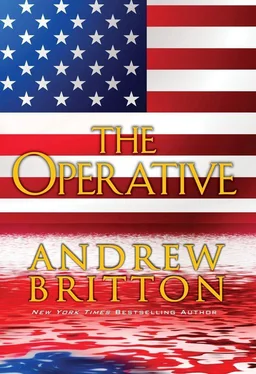Andrew Britton - The Operative
Здесь есть возможность читать онлайн «Andrew Britton - The Operative» весь текст электронной книги совершенно бесплатно (целиком полную версию без сокращений). В некоторых случаях можно слушать аудио, скачать через торрент в формате fb2 и присутствует краткое содержание. Жанр: Триллер, на английском языке. Описание произведения, (предисловие) а так же отзывы посетителей доступны на портале библиотеки ЛибКат.
- Название:The Operative
- Автор:
- Жанр:
- Год:неизвестен
- ISBN:нет данных
- Рейтинг книги:5 / 5. Голосов: 1
-
Избранное:Добавить в избранное
- Отзывы:
-
Ваша оценка:
- 100
- 1
- 2
- 3
- 4
- 5
The Operative: краткое содержание, описание и аннотация
Предлагаем к чтению аннотацию, описание, краткое содержание или предисловие (зависит от того, что написал сам автор книги «The Operative»). Если вы не нашли необходимую информацию о книге — напишите в комментариях, мы постараемся отыскать её.
The Operative — читать онлайн бесплатно полную книгу (весь текст) целиком
Ниже представлен текст книги, разбитый по страницам. Система сохранения места последней прочитанной страницы, позволяет с удобством читать онлайн бесплатно книгу «The Operative», без необходимости каждый раз заново искать на чём Вы остановились. Поставьте закладку, и сможете в любой момент перейти на страницу, на которой закончили чтение.
Интервал:
Закладка:
“Are you saying I’m a good witch or a bad one?”
“Neither, Ryan. I don’t know you. I’m saying that I understand why the president picked you,” Bishop replied. “Since I got the call last night, I’ve been zeroing in on what we have here. The scope of this suggests we’re dealing with the ‘other’ ten percent. A person or persons who are bad because they are bad. That’s why I’m here. Because truly bad men don’t just take cash from the evidence locker or shoot someone because they’re angry at their spouse. They don’t just kill my daughter. They kill a lot of daughters. That’s not going to happen on my watch, if I can prevent it.”
Kealey took a moment to reflect on what Bishop had said. “I like that. But there’s something that doesn’t jibe.”
Bishop regarded him. “What’s that?”
“We don’t know that New York has anything to do with Baltimore. Shouldn’t you be there, where the FBI poser was ID’d?”
Bishop smiled thinly. “Touche. There’s something else.”
Goddamn it, Kealey thought. Nothing ever changes, except to get worse. “What didn’t the sons of bitches tell me?” he asked.
“It came in very early this morning, and I’m sure they didn’t want to wake you,” Bishop said.
“I’m sure they just didn’t want to tell me,” Kealey said. “What is it?”
Bishop touched the tablet several times, then handed it over. It was an eyes-only message from FBI director Cluzot:
Cargo from Quebec hijacked. Believed to be in NYC.
“What cargo?” Kealey asked. A frisson of fear rolled up his spine. His first thought was of a nuclear weapon.
Bishop leaned over and tapped another button. A color photograph came up. It was a mug shot with an RCMP stamp in the corner.
“Top assassin, Pakistani born, spent her teenage years in Damascus and Cairo” he said quietly. He touched a button, and the screen dissolved. It would take a password to get back in. “Heartless merc, no apparent ideology. A CIA agent and I put her on a private jet up there with three Pakistani caretakers. At least, we thought they were. We don’t know what happened, except that three Pakistanis were found dead at the airport after we left, the plane ended up in New York, it was on the ground for under an hour, and then it headed out over the Atlantic.”
“To where?”
“We don’t know that, either,” Bishop said. “The transponder was shut off, and either it was blown up at sea or some pretty sophisticated technology was apparently employed to erase the image from radar. We’re still looking into that.”
“Who was the agent in on the transfer?”
“Someone from Rendition Group One,” Bishop said. “I tried to contact her. No response. When I called her boss this morning, he told me she was in New York on special assignment. He was not at liberty to reveal its nature. Frankly, I don’t think he knew.”
“You suspect she’s looking for the missing cargo?” Kealey said.
“I hope so.” He didn’t have to add, “Either that, or she’s in on the escape.” “I’ve got a call in to the powers-that-be but they haven’t returned it.”
Kealey considered this. “There’s something a little off,” he said.
“The timing?”
“Yeah.”
Bishop nodded. “Why was she involved before I was informed?”
“Right. I can see that it wasn’t an IA issue, but as a matter of course, they would have wanted a debrief of everyone who was on-site.”
“Ordinarily,” Bishop agreed.
He didn’t have to finish.
“Yet they called you for this,” Kealey said.
“They did. When you think you’ve got a mole or a renegade, who do you go to?”
“Right.” He didn’t have to say it. You go to someone their actions impacted. Someone who values the takedown more than their own security. Like Kealey, someone who was hair trigger.
Kealey felt more comfortable with Bishop after that. He wasn’t being critical. What the G-man had said before about Kealey also applied to himself.
“Do they suspect your RG colleague of being involved with what happened in Quebec?” Kealey asked.
“They don’t not suspect her,” Bishop said. “That’s one of the things I’m going to have to find out.”
Kealey leaned back into the seat to think about what Bishop had said. He fell asleep instead. The next thing he knew, they were arriving at Penn Station.
CHAPTER 21
NEW YORK, NEW YORK
New York’s Penn Station was a bunker that used to be a palace. When the original station was ripped down and replaced with the new Penn Station and Madison Square Garden-under the theory that commuters would be more inclined to go to events if they were held right above trains to Long Island and New Jersey-the city lost a glorious and majestic landmark. That architectural disaster, in 1963, was one of the triggers for the creation of the city’s Landmarks Preservation Commission.
The current station was a pair of below-ground hives without character or interest. Since the attacks of 2001, there had been a permanent presence of military reservists there, in addition to the police. Kealey respected their mission, while at the same time seeing hole after hole in the security. It was no different in Washington or at virtually any other train station in the country. Bags went unexamined, were not even spot-checked; tickets to board were glanced at cursorily by conductors as people moved down escalators to the tracks; dozens of shops received deliveries, probably daily, which might not contain bagels or I HEART NEW YORK T-shirts or magazines. This, in addition to the fact that tracks were accessible from the outside before trains passed under the Hudson and East Rivers. Kealey guessed that the backgrounds of porters and employees were only superficially examined.
Of course, as the NYPD and Homeland Security knew, applying manpower to what law enforcement called those “open doors” would be a large commitment of resources with low-yield results. The lone bombers, the homegrown terrorists, would invariably find a way to slip through. The cops and soldiers were eyes on-site for aberrant behavior, and that was the best that could be done. Kealey knew what law enforcement also knew: that the al-Qaidas of the world, the real terrorists, were looking to strike in ways that the West hadn’t considered or had not yet faced. That was the unfortunate nature of this war: the only way to catch them was on the intel side, with HUMNIT and ELINT, the people who infiltrated enemy groups or watched their movements from places of concealment, the digital eavesdroppers who listened for cell phone calls and watched computer posts.
It was for all those reasons that Kealey was not entirely surprised by what happened as they left the station.
He and Bishop were booked in rooms across Seventh Avenue, at Hotel Pennsylvania. Scaffolding had been erected along the Thirty-Third Street side of the building, where workers were doing the initial prep work before dismantling the hotel, which was to be replaced by the city’s third largest building.
The sidewalk was jammed with commuters and tourists, some waiting for taxis at the stand to the left, others going to work in the city’s once-thriving garment district. The first muted crack came after a woman had been spun 180 degrees just a few steps in front of Kealey. He had been unaware of her back, her yellow jacket, until she spun with a raw red hole in her forehead and dropped to the sidewalk, on top of her shoulder bag.
A second crack followed a cabbie’s head exploding inside his vehicle as he pulled from the curb. The car, with its screaming occupants, turned into Seventh Avenue and collided with a hollow crunch against several other vehicles.
From the first shot Kealey was on high alert, his instincts registering the attack before his mind had processed it. He pulled Bishop down flat, crouched for a moment, then ran to a trash can several steps ahead. He pulled down a young man in a business suit who was standing beside it; pieces of the man’s heart blew out his back as Kealey acted.
Читать дальшеИнтервал:
Закладка:
Похожие книги на «The Operative»
Представляем Вашему вниманию похожие книги на «The Operative» списком для выбора. Мы отобрали схожую по названию и смыслу литературу в надежде предоставить читателям больше вариантов отыскать новые, интересные, ещё непрочитанные произведения.
Обсуждение, отзывы о книге «The Operative» и просто собственные мнения читателей. Оставьте ваши комментарии, напишите, что Вы думаете о произведении, его смысле или главных героях. Укажите что конкретно понравилось, а что нет, и почему Вы так считаете.












